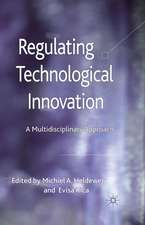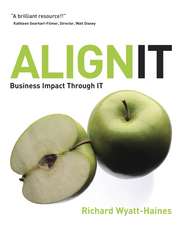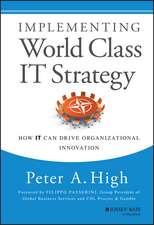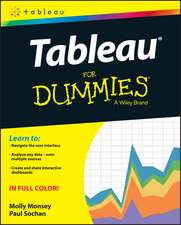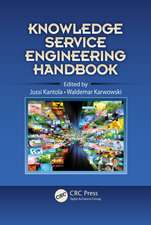Human-Computer Interaction and Management Information Systems: Applications. Advances in Management Information Systems
Autor Dennis F. Galletta, Yahong Zhangen Limba Engleză Paperback – 6 mai 2016
| Toate formatele și edițiile | Preț | Express |
|---|---|---|
| Paperback (1) | 324.16 lei 6-8 săpt. | |
| Taylor & Francis – 6 mai 2016 | 324.16 lei 6-8 săpt. | |
| Hardback (1) | 1052.34 lei 6-8 săpt. | |
| Taylor & Francis – 15 iul 2006 | 1052.34 lei 6-8 săpt. |
Preț: 324.16 lei
Preț vechi: 416.92 lei
-22% Nou
Puncte Express: 486
Preț estimativ în valută:
62.03€ • 64.34$ • 51.72£
62.03€ • 64.34$ • 51.72£
Carte tipărită la comandă
Livrare economică 27 martie-10 aprilie
Preluare comenzi: 021 569.72.76
Specificații
ISBN-13: 9781138692855
ISBN-10: 1138692859
Pagini: 480
Dimensiuni: 174 x 246 mm
Greutate: 0.45 kg
Ediția:1
Editura: Taylor & Francis
Colecția Routledge
Locul publicării:Oxford, United Kingdom
ISBN-10: 1138692859
Pagini: 480
Dimensiuni: 174 x 246 mm
Greutate: 0.45 kg
Ediția:1
Editura: Taylor & Francis
Colecția Routledge
Locul publicării:Oxford, United Kingdom
Notă biografică
Dennis F. Galletta, Yahong Zhang
Cuprins
Series Editor's Introduction, Vladimir Zwass; Foreword, Izak Benbasat; 1. Applications of Human-Computer Interaction in Management Information Systems: An Introduction, Dennis Galletta and Ping Zhang; Part I. Electronic Commerce and the Web; 2. Human-Computer Interaction for Electronic Commerce: A Program of Studies to Improve the Communication between Customers and Online Stores, Izak Benbasat; 3. Understanding the Direct and Interaction Effects of Web Delay and Related Factors: A Research Program, Dennis Galletta, Raymond M. Henry, Scott McCoy, and Peter Polak; 4. Pop-up Animations: Impact and Implications for Website Design and Online Advertising, Ping Zhang; Part II. Collaboration Support; 5. Bridging Distance: Empirical Studies of Distributed Teams, Judy Olson and Gary Olson; 6. Asynchronous Virtual Teams: Can Software Tools and Structuring of Social Processes Enhance Performance? Starr Roxanne Hiltz, Jerry Fjermestad, Rosalie J. Ocker, and Murray Turoff; 7. Collaboration Technology, Tasks and Context: Evolution and Opportunity, Ilze Zigurs and Bjorn Erik Munkvold; Part III. Culture and Globalization; 8. Toward Reliable Metrics for Cultural Aspects of Human-Computer Interaction: Focusing on the Mobile Internet in Three Asian Countries, Jinwoo Kim, Inseong Lee, Boreum Choi, Se-Joon Hong, Kar Yan Tam, and Kazuaki Naruse; 9. Cultural and Globalization Issues Impacting the Organizational Use of Information Technology, Geoffrey S. Hubona, Duane Truex, Jijie Wang, and Detmar W. Straub; Part IV. Learning and Training; 10. Technology-based Training: Toward a Learner Centric Research Agenda, Sharath Sasidharan and Radhika Santhanam; 11. Developing Training Strategies with an HCI Perspective, Lorne Olfman, Robert P. Bostrom, and Maung K. Sein; 12. The Learning Objects Economy: What Remains to Be Done? Conrad Shayo and Lorne Olfman; Part V. User-Centered IS Development; 13. Research Issues in Information Requirements Determination for Systems Development and Human-Computer Interaction, Glenn J. Browne; 14. Dimensions of Participatory in Information Systems Design, John Carroll and Mary Beth Rosson; Part VI. Health Care/Health Informatics; 15. Technology-Enabled Transformations in U.S. Health Care: Early Findings on Personal Health Records and Individual Use, Ritu Agarwal and Corey Angst; 16. Organizational and Individual Acceptance of Assistive Interfaces and Technologies, Adriane B. Randolph and Geoffrey S. Hubona; Part VII. Methodological Issues and Reflections; 17. Conducting Experimental Research in HCI: From Topic Selection to Publication, Alan Dennis, Monica Garfield, Heikki Topi, and Joseph Valacich; 18. Soft versus Hard: The Essential Tension, John Carroll; Editors and Contributors; Series Editor; Index.
Descriere
Provides commentaries and descriptions of research programs that guides 21st century scholars, graduate students, and industry professionals. This work focuses on applications and evaluations including special case studies, specific contexts or tasks, HCI methodological concerns, and the use and adoption process.




